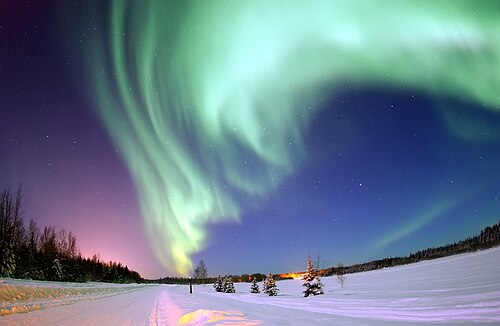Auroranoun
An atmospheric phenomenon created by charged particles from the sun striking the upper atmosphere, creating coloured lights in the sky. It is usually named australis or borealis based on whether it is in the Southern or Northern Hemisphere respectively.
Auroranoun
The rising light of the morning; the dawn of day; the redness of the sky just before the sun rises.
Auroranoun
The rise, dawn, or beginning.
Auroranoun
The Roman personification of the dawn of day; the goddess of the morning. The poets represented her a rising out of the ocean, in a chariot, with rosy fingers dropping gentle dew.
Auroranoun
A species of crowfoot.
Auroranoun
The aurora borealis or aurora australis (northern or southern lights).
Auroranoun
the first light of day;
Auroranoun
an atmospheric phenomenon consisting of bands of light caused by charged solar particles following the earth's magnetic lines of force
Auroranoun
(Roman mythology) goddess of the dawn; counterpart of Greek Eos
Aurora
An aurora (plural: auroras or aurorae), sometimes referred to as polar lights (aurora polaris), northern lights (aurora borealis), or southern lights (aurora australis), is a natural light display in the Earth's sky, predominantly seen in high-latitude regions (around the Arctic and Antarctic). Auroras are the result of disturbances in the magnetosphere caused by solar wind.
Nebulanoun
(astronomy) A cloud in outer space consisting of gas or dust (e.g. a cloud formed after a star explodes).
Nebulanoun
A white spot or slight opacity of the cornea.
Nebulanoun
A cloudy appearance in the urine
Nebulanoun
A faint, cloudlike, self-luminous mass of matter situated beyond the solar system among the stars. The term was originally applied to any diffuse luminous region. Now, technically, it is applied to interstellar clouds of dust and gases (diffuse nebula). However distant galaxies and very distant star clusters often appear like them in the telescope, such as the spiral nebula in Andromeda, known now to be a distant galaxy.
Nebulanoun
A white spot or a slight opacity of the cornea.
Nebulanoun
a medicinal liquid preparation intended for use in an atomizer
Nebulanoun
cloudiness of the urine
Nebulanoun
an immense cloud of gas (mainly hydrogen) and dust in interstellar space
Nebulanoun
(pathology) a faint cloudy spot on the cornea
Nebulanoun
a cloud of gas and dust in outer space, visible in the night sky either as an indistinct bright patch or as a dark silhouette against other luminous matter.
Nebulanoun
a galaxy.
Nebulanoun
a clouded spot on the cornea causing defective vision.
Nebula
A nebula (Latin for 'cloud' or 'fog'; pl. nebulae, nebulæ or nebulas) is an interstellar cloud of dust, hydrogen, helium and other ionized gases.


















